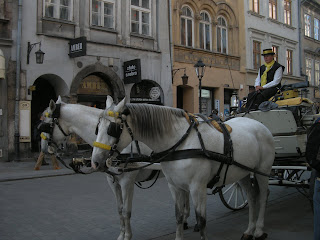








On the road to Poland . . .
Driving through Slovakia now with a very informative read-aloud from a woman on our bus about the history of the nation. I expect this level of preparedness about Ireland from you Mom!
Foliage through Slovakia and the views through the mountains are once again spectacular and further convincing me that Fall is the season to travel in Europe.
Krakow
Beautiful old town. Sue says its up there with Prague, but nicer cause there’s fewer tourists. Preserved due to being unbombed in WWII. Largest public square in all of Europe. Mexico City’s is the only we’ve seen that’s more impressive
Saltmines-Visited some underground saltmines just outside of Krakow that go hundreds of meters underground and that only recently closed as an active salt mine (less than 10 years ago, I believe). Its fascinating not for the salt, but because of the sculptures and church created underground ENTIRELY OUT OF SALT. That’s right, everything is salt. And it was all created by the miners themselves. I also learned that the expression “Salt of the earth” meaning the best of the world, comes from salt being so valuable in the past. Miners were paid in salt and therefore the job of miner was a favored profession.
Hearing things about Poland that I never knew and wondering about my education. Why am I not familiar with the Polish fighting of the communists in 1919 (I think) with a smaller army and preventing the spread of communism across Europe. This was called one of the most important battles of all time and I had never heard of it. How little I know (and how much more I’m forgetting!).
On the flipside (but not to be flippant), we visited the Auschwitz/Birkenau concentration camps in Poland. These, I know something about. A lot in fact, due to the Holocaust being a big part of most curriculums in the US, the many excellent (and popular) books and films on the subject. Therefore (I’m almost embarrassed to say), Auschwitz/Birkenau was a bit of a disappointment. I already felt as if I had been there through the many books and films I had seen. I knew the horrific things that occurred there (as well I should) and seeing it in person didn’t open my eyes any wider because they were open pretty damn wide already. This is a good thing, as it means that popular culture and media and education have gotten very important message across to me and many other Americans about events that should never be repeated.
At the same time, why was I (and why are most Americans still) unaware of the atrocities committed by the Japanese across Asia before and during WWII before I went to Korea? Why can 90% of Americans tell you who the Nazis and Hitler are, but maybe 5% tell you who the Khmer Rouge and Pol Pot are? Why do many Americans find the holocaust synonymous with genocide and are unable to provide other examples? Where is all this in our curriculums?
The other thing I was struck by is how my pre-conceptions of Germans were so off-base. In the US, and in talking to other Europeans in Europe, Germans are still portrayed as Nazi-esque, as stiff and with racist intentions beneath their exterior. From my experience, nothing could be further from the truth. On the contrary, Germans seem willing to atone for their forefathers atrocities and are all extremely well-educated about the Holocaust and the Nazi party. They are leery of their politicians leading them down that same path again, they visit concentration camps as part of their graduation requirements, and generally seem to want to remember the past, but also to move forward. Yet, they still get the Nazi jokes from Americans and those elsewhere. If I were a German who had nothing to do with the Holocaust, I would be sick of it.
The Japanese, on the other hand, have a generation of students who have no idea about the atrocities committed by their forefathers because it simply isn’t taught in school (witness the Korean protests over history distortion in Japanese textbooks), have not made even a quarter of the effort of Germany in apologizing or owning up to their misdeeds publicly, and yet have never been portrayed in the west as anything but a hard-working, dedicated nation in the west worthy of respect (and a little jealousy).
What is wrong with this picture?
1 comment:
It's complicated Dan, but I have friends from Germany who tell me that in many parts of the former East Germany there is still a pro-Nazi presence. I noticed the same things that you did when visiting Berlin. I think the more cosmopolitan cities in Germany are what you are talking about.
I completely agree with you about Japanese and Korean history. History is constantly be written and rewritten. There was a long time in the USA when revisionist historians dominated the discourse surrounding the American civil war and the reconstruction period. Look up the Dunning School and you'll see where the ideology in the film Birth of a Nation comes from.
It's all about fighting the old historical texts and demanding new ones.
Don't even get me started on the pro-Palestinian "art" show I saw in Berlin.
Post a Comment